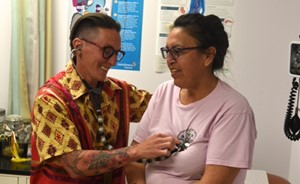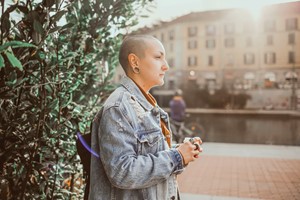Finding inclusive continuing care
If you’re ageing or living with chronic or advanced illness, you may be facing difficult decisions about where to live and how to find Two-Spirit & LGBTQ+ inclusive care. At the end of your life, you may hope to be surrounded and celebrated by the people who love you and be at peace with the life you’ve lived and the choices you’ve made. Whether you require home care or need to move to a care centre, take time to find care that is accepting and respectful of you as a 2SLGBTQ+ person, as not all service providers take the same approach.
“In my generation, there were many of us who’d been very out and very public. We’d worked hard for the rights we have now, but there’s this thing where people in our community ‘go back into the closet’ when they have to go into residential care. I understand it for people who are a generation older than me because that’s been their life story, but it’s not been the life story of my generation.”
Before you can begin to search for inclusive care, consider what matters most to you. What does 2SLGBTQ+ inclusive care mean to you?
“For 2SLGBTQ+ people getting care, it can be very intimidating to disclose details that might make people uncomfortable. I know so many people who just let others believe that they are ‘straight’ so that it doesn’t interfere with care for their loved one.”
You might ask yourself more questions, such as:
- Who are the significant people in my life? Who is – and is not – part of my family of choice?
- Do I want to be emotionally expressive or openly affectionate with my partner, family, or friends?
- How important is it for me to express my gender identity and/or expression or sexual orientation without fear of discrimination or poor treatment?
- Do I want to be able to freely express myself in my dress and grooming?
- Are there religious or spiritual practices that I want to be able to continue or avoid?
- Do I have activities or interests that I want to continue?
- What does ‘safety’ mean to me – e.g., from physical or other harm, privacy, confidentiality?
- How involved do I want to be in decision-making about my care – e.g., medications, life-prolonging interventions?
- Are there other people whom I want to be involved in decisions about my care?
- If I move to a care centre, what items and possessions would I want to have with me? How much room will I need?
“We love; we get angry; we’re not morally corrupt, and we have feelings. Dignity is higher than respect, especially when we’re in vulnerable situations. We should be treated with dignity.”
“The staff at the hospice said things like, ‘It's so warming to see the two of you being so affectionate with each other.’ I said, ‘Why wouldn’t we be affectionate? She’s my wife? Love is love.’ They admired how I pampered her.”
Once you’ve given thought to what inclusive care means to you, your next step is to explore your options with different home care providers or other care centres.
You may be able to visit or even try out a stay at some. This will allow you to speak with staff and residents and get a ‘feel’ for the place. Think about what questions you might want to ask, such as:
- Do they have 2SLGBTQ+ policies and practices in place? What are they?
- Do staff receive training regarding 2SLGBTQ+ healthcare issues?
- Do intake and other forms have a range of options where you can choose to disclose information, such as your gender, pronouns, relationship status, or household composition?
- Are there signs of 2SLGBTQ+ inclusivity – e.g., images or written materials that portray 2SLGBTQ+ positively? Are there other 2SLGBTQ+ residents or staff? Are staff given orientation and ongoing training about 2SLGBTQ+ inclusivity?
- Does the centre have a Bill of Rights for its residents? Is 2SLGBTQ+ inclusivity part of it?
- Are the staff knowledgeable about 2SLGBTQ+ health issues – e.g., hormone replacement therapy (HRT) and screening for trans people; long-term effects of antiretrovirals (ARV) and compromised immune systems for HIV+ people?
- How involved can you be in decision-making about your care?
- Will you be able to have privacy if you wish to be intimate with someone?
- Will your gender be recognized, acknowledged, and respected?
- Will members of your family of choice be accepted, respected, and included according to your wishes?
“There should be signs that the environment is safe and inclusive, such as rainbows on the front door or pamphlets available in the waiting areas for sexually and gender diverse people. These are ways of saying ‘we accept you.’”
“I had a friend who moved to a long-term care facility, and he wasn’t comfortable there. He was worried that if people found out that he was gay, he would be treated differently. It was upsetting to me that he had to worry about discrimination at this stage of his life.”
If you are a 2SLGBTQ+ older adult, you may be facing additional issues as you age. Research indicates these may be caused by:
- Social isolation resulting from being single or without children.
- Lack of connection with biological family.
- Limited income or financial challenges.
- Higher risk of depression or a negative self-image because of discrimination.
If you’re younger and need continuing care, you may experience increased social isolation because of your gender identity or sexual orientation and your age. Most people in care centres are older adults.
All of these factors can contribute to barriers that you may face in finding inclusive care. Your choices may be limited by the lack of inclusive care centres where you live. You may not have enough money to pay for private care or move somewhere else, or you may not want to move elsewhere because it would mean losing important connections.
Keep in mind that social awareness and attitudes change all the time and influence how health and other care are provided to 2SLGBTQ+ people. As more 2SLGBTQ+ people age, there will be more who need continuing care. There can be power in numbers, and already there are care centres that have taken steps to be more inclusive.
Although there remains room for improvement, you may find a care centre accepting, welcoming, and open to making the changes needed for it to become truly inclusive.
“Another resident looked at my partner and said, ‘All you need is a boyfriend.’ My partner looked her straight in the eye and told her, ‘I don’t need a boyfriend. I have a girlfriend.’ That was the first time that she let anyone know she was a lesbian. One of the things that really touched me was that one of the frontline workers came over to the table and, without saying a word, she put her hand on her heart and she looked at my partner. That made a huge difference.”
“Our friends were our family, they were the ones who embraced and supported us, and who were there for me after he died.”
There is much strength, creativity, and support available within 2SLGBTQ+ communities. Particularly if you’re feeling alone at this time in your life, remember that it may help to turn to others.
Consider contacting a 2SLGBTQ+ organization to see what assistance they can offer. There may be others interested and able to support you, for example, by advocating for changes and promoting 2SLGBTQ+ inclusive care.
You may be able to find support elsewhere, such as community organizations, or you may find a staff member such as a social worker or nurse who is willing to advocate on your behalf.
“I had a friend who moved to a long-term care facility, and he wasn’t comfortable there. He was worried that if people found out, he was gay that he would be treated differently. It was upsetting to me that he had to worry about discrimination at this stage of his life.”
If you haven’t already done so, consider delegating someone to be your healthcare advocate or “substitute decision-maker”. If you become unable to communicate your wishes or make decisions, this person can be very important in ensuring that you receive the care you want.
You may also want to make an Advance Care Plan that gives medical and healthcare providers instructions about your wishes and preferences.
Developing relationships with the healthcare team, including homecare workers is important.
"My partner was hospitalized for almost nine months. Although the care he received was very good, there were a few times that I needed to go to bat for him. We developed a good relationship with the care team, and they often responded quickly to our concerns."
"We were a gay couple, and my partner had HIV. It was vital that everyone who came into our home be at ease with my partner’s health and our relationship. To be upfront, I requested to interview all homecare workers before they were assigned to our home. I’m really glad I did. Although most of them were excellent care providers, it was obvious a few weren’t very comfortable. I knew my partner would have been uneasy, so I prevented that situation from ever happening. It was our home, our sanctuary, and I had to ensure it remained so for us."
Read more
Videos
More Articles

Leaving a legacy

What does "2SLGBTQ+" mean?

Managing difficult situations

Planning ahead: Your wishes

How to be an ally

How to provide inclusive care to Two-Spirit & LGBTQ+ people

Getting the care that you need

About your grief

Choosing a healthcare advocate

Finding 2SLGBTQ inclusive care

Making an advance care plan

Choosing a financial advocate

Making a will

Why inclusivity matters

For family, friends, and unpaid caregivers

Canadian Healthcare Bill of Rights

My Choices for Safe and Inclusive Healthcare
Featured Content

2SLGBTQ+ Canadian Healthcare Bill of Rights
Read More
MyGrief.ca Module - Grief in 2SLGBTQ+ communities
Read More
My Choices for Safe and Inclusive Healthcare
Read More
Planning for My Care
Read More
2SLGBTQ+ Knowledge Synthesis
Read More
Webinar: Improving access to respectful & inclusive care.
Read More
2SLGBTQ+ Canadian Healthcare Bill of Rights Infographic
Read More



